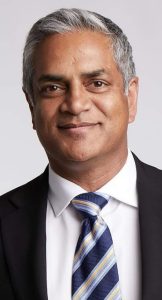
“I was bored,” Independence Township resident and orthopedic surgeon Shivajee Nallamothu said. “I got bored during COVID, so I decided to write a book. Actually, I decided to write two books.”
Well, la-tee-da, way to be an overachiever, Doc!
I’ve known Shivajee, or Dr. Feelgood, as I like to call him, for about 20 years (we’re even friends on social media websites). I know he and his wife Theresa have three children, Sarina, Daman and Kamran. Heck, I think once I went to their home for a fundraiser. I have been laid out, naked save for a little hospital gown, before him and knocked out with some good narcotics, while he cut into my knee last year to reconnect my torn patellar tendon. He did such a good job, I never needed to use the prescription of pain medication he prescribed for me. Every time I look at my knee and see that six inch scar, I think of Shivajee.
My knee does feel good, by-the-way.
He’s been a surgeon in the Clarkston area for 23 years and for the last 20 years he has “had the pleasure” of coaching basketball from 4th grade girls to JV high school basketball at Everest Collegiate school in Independence Township. While I call him Feelgood, his players call him something much more appropriate, Coach Nall.

Last week he reached out to me and said when our state of Michigan was shut down for the pandemic he couldn’t doctor and he couldn’t coach so he turned to writing and he just finished a 150-plus page book titled, “Parenting Mental Toughness in Your Young Athlete.” Its subtitle is, “How to Raise a Well-Motivated and Positive Young Athlete for Now and Their Future Career.”
I reckon coaches and student-athletes could read it too, but it really targets parents.
In the beginning of the book, he wrote, “ . . . Being the parent your teen athlete needs is about more than just cheering from the stands or providing financial support. It’s about navigating the complex terrain of their athletic journey while also helping them grow into well-rounded individuals. In this chapter, we will uncover the secrets to becoming the guiding force that empowers your teen athlete to reach their full potential, both on and off the field.
“Join us as we delve into the intricacies of balancing unwavering support with healthy boundaries, understanding the psychological impact of sports on teenagers, and fostering open communication that strengthens the parent-athlete bond. Through real-life anecdotes, expert insights, and practical strategies, you will discover how to cultivate an environment where your teen athlete can thrive, overcome challenges, and build a solid foundation for their future success . . .”
I asked him why he wanted to write this book, his answer was pretty straight forward. “Being a program director for Michigan State University orthopedic surgery program and being a coach go hand-in-hand in connecting with people who are driven to succeed. I feel I’ve had the experience to be able to relate with them, work with them, and help them improve themselves,” he said. “It’s important to treat each individual differently depending on how advanced they are and how much additional help they may need. These relationships are on-going for a lifetime. To be able to make an impact on them is a humbling experience, which helps me grow as a coach and a trainer for future surgeons.”
He hopes this book will be a resource for helping parents help their young athletes “develop into a great athlete with realistic expectations.”
The chapters deal with different issues such as mental toughness, sports psychology, diet (recipes for healthy athletic development are included), and being a positive influence on children. It also helps parents to grow with their child as they get older and to push them on in a healthy way.
Shivajee said his book will come out in the next month as an ebook and a paperback on Amazon. Copies will also be at Inscribe book store in Clarkston when it releases.
* * *
He said his next book – a book of fiction – will be written under a pen name and should be available in “about six weeks.”
“When I started the parenting book I would get bored with that then I would work on the fiction book. After a while I would get bored with that one and go back to the non-fiction book.”
For a dude who trains future surgeons, has his own practice, coaches area youth, is a husband and a father (and I imagine some sort of social life), I have one question for him: “Feelgood, how do you have time to be bored?”
Send your comments to DontRushDon@gmail.com
